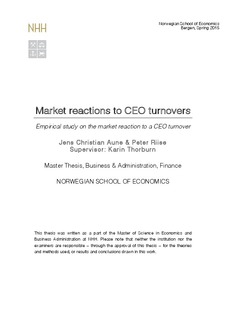Market reactions to CEO turnovers : empirical study on the market reaction to a CEO turnover
Master thesis
Permanent lenke
http://hdl.handle.net/11250/301081Utgivelsesdato
2015Metadata
Vis full innførselSamlinger
- Master Thesis [4372]
Sammendrag
This thesis examines the effect of CEO attributes and company fundamentals on
company performance in CEO turnovers. The analyses were performed on a sample
of 899 CEO turnovers between 2003 and 2009 in companies listed on the S&P 1500
composite index in the US. A six-step model exploring various perspectives of the
CEO turnover in the period [Event day -1/+2 years] finds that the market, on
average, yields negative announcement return and then positive cumulative
abnormal return in the subsequent two years. Our main finding is that the market
reacts to changes made to the company fundamentals, and that it generally
rewards changes in company fundamentals contributing to enhance the robustness
of the companies’ balance sheets. We find that MBAs tend to run the operations
with lesser margins, in terms of balance sheet robustness. Nonetheless, the different
behavior between MBAs and engineers does not explain the market reaction. Even
though MBAs and engineers have different fiscal strategies in the way they operate
companies, the abnormal return is not sensitive to hiring a CEO with these
educational profiles alone. It is rather the experience, and the fact that CEOs, on
average, are able to introduce changes that fit the companies’ needs that appear to
generate abnormal reactions in stock value. We also find that positive abnormal
stock return in the transition year materializes in increased ROA and EBITDA margin
in the two subsequent years. This confirms that the market is able to identify CEO
turnovers that prove successful. This thesis confirms several previous findings within
the research field of CEO turnover, and adds to the understanding of the underlying
reasons for market reactions to CEO turnovers.
